
October / November 2021 – Volume 25, Issue 4
Editors: Stephen DiDonato and Joyce Yip Green
Table of Contents
Message from the President
- The Lynn Stuart Weiss Lecture at the 2022 APA Convention
- Available Positions on Division 52 Board
- APA Convention 2022 Call for Proposals
Pilot Study Corner
- Intergenerational Transmission of War Trauma Among Afghan Refugees in Canada
Global Perspectives
- Global webinar focused on student resources for international psychology
- Post-War Recovery Humanitarian Mission in Armenia
Early Career Professionals
- Early Career Psychology (ECP) Corner!
Student Corner
-
Message from 2021 Student Chair
Webinars
- Division 52 Webinar Series
Book Review
- International Collaboration in the Study of Positive Youth Development: Advancing Research, Policy and Practice in Global Contexts
International Perspectives in Psychology
- Announcement of Incoming Editor beginning 2022!
Note from the Editors
Art/Poetry Corner
Convention Reflections (Word Cloud)
 Message from our President
Message from our President
Lawrence H. Gerstein, PhD
Hello from Indiana, which is considered the Heartland of the United States. Fall, Summer, and Winter seem to be weaved into our day-to-day experiences here with our leaves late to amaze us with their beautiful vibrant colors.
My term as your President is about over. This year appeared to unfold at warp speed. My juggling skills have been tested and I have learned that the quality of my skill has diminished. For the first time since entering the universe of email, I lost control of my inbox. Prioritizing my professional responsibilities with my desire to protect and enjoy my personal relationships and recreational activities, and at the same time, giving myself permission to be a “slacker” and “avoider” was challenging to say the least, and highly unusual for me. I’ve grown lots this year, accepting and valuing my limitations, and “letting some professional responsibilities go.”
The emotional, intellectual, and behavioral space I have devoted to our Division has been extremely rewarding, inspiring, and stimulating. Our leaders, especially our Board members, students, ECPs, and the “older” generation are incredibly talented and devoted. Their vision, wisdom, creativity, action, and dedication were contagious. I strongly urge our students and ECPs to increase even more their engagement and activities in our Division. Our members also impressed me with their ideas, recommendations, and commitment to globalizing psychology in ways that respect and embrace the diversity of culture, science, education, and practice.
I have come to realize that our Division is comprised of a very large number of inviting, kind, warm, helpful, compassionate, generous, and talented people. Before serving as President, I had no insight into how many of our members could be described with these characteristics. I’m certain that our Division has the capacity to be a major player in the effort to radically decolonize, reshape, and redefine psychology worldwide. I hope we will continue to contribute to this important and urgent endeavor.
I have grown this past year in my cross-cultural and cross-national knowledge, skills, and motivation. I’ve loved being able to frequently collaborate with individuals from different countries and get the opportunity to sustain these relationships. Of course, I would have preferred to share meals, exchange stories, listen to music, and explore the countries of these individuals in person and not virtually. It has been such a gift to establish new relationships and strengthen existing relationships with people around the globe. I have witnessed a greater number of people from outside the United States involved in our Division. We need many, many more to function and be perceived as a culturally informed, appropriate, and competent international or global psychological association.
It has been an honor to serve as your President and to be a member of the Division’s Board. I received unending support, encouragement, feedback, and suggestions from our Board members. I’ve also been privileged to closely collaborate with and learn from Brigitte, Nancy, Kurt, Tony, Neal, and Merry. Whatever I accomplished resulted from my interactions with all of the Board members, and other leaders and members of our Division. Thank you!
Thank you, as well to my wife, Dawa Lhamo, Taktser Rinpoche, my teachers, my deceased parents and numerous relatives, and my international students and colleagues for introducing and mentoring me to cherish and develop an insatiable appetite to travel, respect, and learn about people, places, and cultures outside of Brooklyn, New York and the United States.
I hope you have been pleased with my leadership and vision for our Division. Kurt Geisinger and Antonio (Tony) Puente will assume much more responsibility for our Division starting January 1. I’m quite confident that our Division will continue to thrive and expand during their leadership. Given their remarkable strengths as leaders, I’m excited when contemplating how our Division will grow.
I enthusiastically encourage you to consider running for one our elected positions this next year including President, Vice President for Communication and Publication, Vice President for Initiatives, Secretary, ECP Chair, and Student Chair. If you are interested, please email me (lgerstein@bsu.edu) by December 15 your Vita and a statement indicating why you want to run, your vision for the office and how you might contribute to the Division, and why you believe you are qualified.
I wish you a happy holiday season, health, peace, and meaningful relationships and safe travels!
The Lynn Stuart Weiss Lecture at the 2022 APA Convention
Division 52 welcomes nominations of individuals qualified to present The Lynn Stuart Weiss Lecture at the 2022 APA Convention.
Self-nominations as well as nominations of others are welcome. To be considered for this prestigious lecture, individuals must be Division 52 members, psychologists with at least 10-years of experience post-doctoral degree, and demonstrate extensive expertise in the science, teaching, application, and/or art of politics, with a focus on world law, and/or peace.
Nominations should include a CV, 500-word statement describing extensive expertise in the science, teaching, application, and/or art of politics, with a focus on world law, and/or peace, and two Letters of Support. Application materials should be emailed to Lawrence Gerstein (lgerstein@bsu.edu) by 5:00pm EDT November 18, 2021. The Division 52 Presidential Quartet will review the applications and submit a recommendation to the Committee on Division/APA Relations (CODAPAR). If CODAPAR supports the Presidential Quartet’s recommendation, the speaker’s name will be submitted to the APF Board for approval.
Description of The Lynn Stuart Weiss Lecture
The Lynn Stuart Weiss Lecture was established in 1998 by Drs. Raymond A. and Rosalee G. Weiss, in memory of their daughter, Lynn, whose interests centered on the science and art of politics, with a focus on world law. The Lecture fund is administered by the American Psychological Foundation (APF), and the Lecture series is administered by the Committee on Division/APA Relations.
An annual lecture presented at the APA Annual Convention will be related to Lynn’s goal of searching for ways in which world peace could be attained. Her interest centered on the science and art of politics with a focus on world law. Lynn’s focus with the range of interests in at least four of APA’s Divisions:
- Division 9 – Society for the Psychological Study of Social Issues
- Division 41 – American Psychological-Law Society
- Division 48 – Society for the Study of Peace, Conflict and Violence: Peace Psychology
- Division 52 – International Psychology
CODAPAR will solicit, on a rotating basis, a speaker from the above divisions. After CODAPAR’s approval, the speaker’s name will be submitted to the APF Board for approval.
The selected speaker will receive a $1,000 honorarium, and APF will provide a printed brochure to be disseminated during the lecture that includes information on Lynn Stuart Weiss, as well as the selected speaker. The programming hours for the Weiss Lecturer will be provided by APF.
Please consider running for one of the following elected Board positions: President, Vice President for Communication and Publication, Vice President for Initiatives, Secretary, ECP Chair, and Student Chair. The election for these positions will take place next year and the term of office will begin January 1, 2023. If you are interested, please email Lawrence Gerstein (lgerstein@bsu.edu) the following by December 15, 2021: your Vita, and a statement indicating why you want to run, your vision for the office, how you might contribute to the Division, and why you believe you are qualified. You can find information on the terms of office and responsibilities of these positions by reviewing the Division bylaws.
APA 2022
August 4-6, Minneapolis, MN
Call for Proposals – Now Open
Division 52 International Psychology is seeking proposals. This year, Division 52 is enthusiastic to accept proposals that can inform members in the psychology community about what is happening in psychology around the world and what major issues are occurring in the world. Global mental health issues, both from the mainstream scientific approach and from the indigenous approach, are also invited. Please consider submitting one or more proposals!
Div52, along with other APA divisions, is soliciting DIVISIONAL PROGRAMMING PROPOSALS for a range of program types, including:
- Skill-Building Sessions (50 minutes)
- Data Blitz Sessions (50 minutes)
- Symposia 2.0 Sessions (50-110 minutes)
- Critical Conversation Sessions (50 minutes; formerly called Discussions)
- Poster Sessions (in-person and online options available)
Divisional programming proposals must be submitted by 5 pm ET on Friday, December 17, 2021.
Outside of divisional programming, there are two other types of programming for which Div52 members might want to submit proposals:
PSYCH SCIENCE IN 3: PS-in-3 invites graduate students and recently matriculated psychologists to share their research in three short minutes. The language must be appropriate to an educated but non-specialist audience. A selection committee will choose the top eight finalists who will compete in person at APA 2022 for the top three prizes. PS-in-3 proposals must be submitted by 5 pm ET on Friday, December 17, 2021.
CONTINUING EDUCATION (CE) WORKSHOPS: 4- and 7- hour CE workshops are offered on a full range of topics across the discipline and profession of psychology. An emphasis is placed on interactive workshops that actively engage participants in a variety of learning modes. CE Workshop proposals must be submitted by 5 pm ET on January 10, 2022.
The Co-chairs for Div52 @ APA 2022 are Dr Joyce Yip Green and Dr Scarlett Choi. Please reach out to our Co-chairs with any questions you may have.
Visit the APA 2022 website to read the full Call for Proposals and to make submissions.
Intergenerational Transmission of War Trauma Among Afghan Refugees in Canada
Rosalind Ghafar Rogers, PhD Candidate, LMHC
The Chicago School of Professional Psychology, Washington D.C.
 As evacuations in Afghanistan come to an end and the U.S. presence disappears after 20 years, the impact of war on incoming Afghan refugees, parolees and subsequent generations is a timely and urgent topic for International Psychology.
As evacuations in Afghanistan come to an end and the U.S. presence disappears after 20 years, the impact of war on incoming Afghan refugees, parolees and subsequent generations is a timely and urgent topic for International Psychology.
Due to four decades of war in Afghanistan, the vast majority of Afghans have been exposed to at least one traumatic event (Kovess-Masfety et al., 2021), and there are over 4.6 million Afghan refugees worldwide (UNHCR, 2020). Studies have found high rates of psychological distress (Sulaiman-Hill & Thompson, 2012), depression and anxiety (Gerritsen et al., 2006), and posttraumatic stress disorder (PTSD; Ahmad et al., 2019) among Afghan refugees. The potential for these effects to be intergenerationally transmitted among Afghan refugees is high.
From November 2020 to July 2021, 44 first- and second-generation Afghan refugees in Canada completed online surveys that asked for demographic information and assessed exposure to traumatic events and PTSD (Harvard Trauma Questionnaire; Mollica et al., 1992), depression and anxiety (Hopkins Symptom Checklist-25; Derogatis et al., 1974), and culturally specific symptoms of emotional distress (Afghan Symptom Checklist; Miller et al., 2006). Two parent-offspring dyads who completed the online surveys participated in one-on-one remote interviews that explored the intergenerational transmission of war trauma.
Discussion
Results showed that participants directly experienced an average of three traumatic events, with approximately 48% to 66% symptomatic for PTSD, depression, or anxiety. Despite the first-generation’s greater direct exposure to trauma, the second-generation’s scores were higher than the first-generation across all symptom measures. Overall, these results support the intergenerational transmission of war trauma from first-generation Afghan refugees to offspring.
Semi-structured interviews resulted in five themes. Theme 1, war changed everything, captured parents’ experiences of war. Theme 2, parental collective suffering and perceived parental losses captured the impact of war on parents that included a collective sense of suffering and injustice, loss of trust and social status, and re-traumatization due to media exposure to ongoing war in Afghanistan. Previous research has found collective trauma exposure to be as strong in predicting depressive symptoms as individual exposure (Giacaman et al., 2007). Consistent with research on the adverse effects of certain trauma communication patterns (Dalgaard & Montgomery, 2015), theme 3, parental communication and offspring’s experiential knowledge reflected parents’ avoidant, fragmented, detailed, and expressive trauma communication patterns. Theme 4, parent-offspring disrupted relationships and dysfunctional communication patterns reflected potential mechanisms of transmission and intergenerational effects that are consistent with the research literature (Sangalang & Vang, 2016). Parental emotional detachment and fearful functioning led to parents’ avoidant communication, diminished emotional availability, and harsh, overprotective, and role-reversing parenting. Intergenerational effects on offspring included a sense of disconnection from parents, difficulties expressing emotions, people-pleasing, anxiety, overachievement, and a chronic stress-related condition. The fifth theme, the emotional is cultural, reflected the role of Afghan culture in intergenerational trauma and its influence on offspring’s emotional experiences.
The results of this study have important implications for International Psychologists who can advocate for and provide culturally responsive, trauma-informed services to Afghan refugee families.
References
Ahmad, F., Othman, N., & Lou, W. (2019). Posttraumatic stress disorder, social support and coping among Afghan refugees in Canada. Community Mental Health Journal, 56, 597-
https://doi.org/10.1007/s10597-019-00518-1
Dalgaard, N. T., & Montgomery, E. (2015). Disclosure and silencing: A systematic review of the literature on patterns of trauma communication in refugee families. Transcultural
Psychiatry, 52(5), 579-593. https://doi.org/10.1177/1363461514568442 Derogatis, L. R., Lipman, R. S., Rickels, K., Uhlenhuth, E. H., & Covi, L. (1974). The Hopkins
Symptom Checklist (HSCL): A self-report symptom inventory. Systems Research and Behavioral Science, 19(1), 1-15. https://doi.org/10.1002/bs.3830190102
Gerritsen, A., Bramsen, I., Deville, W., van Willigen, L., Hovens, J., & Ploeg, H. (2006). Physical and mental health of Afghan, Iranian, and Somali asylum seekers and refugees
living in the Netherlands. Social Psychiatry and Psychiatric Epidemiology, 41(1), 18-26. https://doi.org/10.1007/s00127-005-0003-5
Giacaman, R., Shannon, H. S., Saab, H., Arya, N. & Boyce, W. (2007). Individual and collective exposure to political violence: Palestinian adolescents coping with conflict. European Journal of Public Health, 17(4), 361-368. https://doi.org/10.1093/eurpub/ckl260
Kovess-Masfety, V., Keyes, K., Sabawoon, A., & Sarwari, B. A. (2021). A national survey on depressive and anxiety disorders in Afghanistan: A highly traumatized population. BMC Psychiatry, 21(1), 1-12. https://doi.org/10.1186/s12888-021-03273-4
Miller, K. E., Omidian, P., Quraishy, A. S., Quraishy, N., Nasiry, M. N., Nasiry, S., Karyar, N. M., & Yaqubi, A.A. (2006). The Afghan Symptom Checklist: A culturally grounded approach to mental health assessment in a conflict zone. American Journal of Orthopsychiatry, 76(4), 423-433. https://doi.org/10.1037/0002-9432.76.4.423
Mollica, R. F., Caspi-Yavin, Y., Bollini, P., Truong, T., Tor, S., & Lavelle, J. (1992). The Harvard Trauma Questionnaire: Validating a cross-cultural instrument for measuring torture, trauma, and posttraumatic stress disorder in Indochinese refugees. Journal of Nervous and Mental Disease, 180(2), 111-116. https://doi.org/10.1097/00005053-199202000-00008
Sangalang, C. C. & Vang, C. (2016). Intergenerational trauma in refugee families: A systematic review. Journal of Immigrant Minority Health, 19, 745-754. https://doi.org/10.1007/s10903-016-0499-7
Sulaiman-Hill, C. M. R. & Thompson, S. C. (2012). Afghan and Kurdish refugees, 8-20 years after resettlement, still experience psychological distress and challenges to well being. Australian and New Zealand Journal of Public Health, 36(2), 126-134. https://doi.org/10.1111/j.1753-6405.2011.00778.x
UNHCR. (2020, June 18). Figures at a glance. https://www.unhcr.org/en-us/figures-at-a-glance.html
Global webinar focused on student resources for international psychology
Daniel A. Balva & Harold Takooshian
“What resources are available to students who want to be more involved in international psychology?”
On Friday, September 10, 2021, 63 participants from several nations joined a global webinar on this timely question. This 90-minute webinar was the first collaboration of the APA Division of International Psychology (D52) with the Psychology Coalition at the United Nations (PCUN).
This webinar was chaired by D52 Student Committee Chairperson Daniel A. Balva, of the University of Georgia. After a moment of silence for the 2,977 martyrs of the 9-11-2001 terrorist attack on America, the participants were welcomed by Dr. Elaine P. Congress of PCUN. This webinar brought together seven experts to address seven specific topics: (1) D52 President Lawrence H. Gerstein addressed the benefits to students of joining APA and its divisions (D52 and D48). (2) Dr. Ani Kalayjian of Meaningful World described how to volunteer for humanitarian projects. (3) Dr. Gabriel Twose of the APA Office of International Affairs described APA resources for students. (4) D52 Treasurer Dr. Martha S. Zlokovich spoke of funding for international student activities. (5) Shenae C. Osborn of PCUN described why and how students can publish their work. (6) Dr. Teresa Ober of the APA Division of Teaching of Psychology (D2) described why and how students can become involved in international organizations. Dr. Harold Takooshian of PCUN described how students can become involved in the work of the United Nations. These seven messages were followed by a lively Q+A.
This webinar was hosted and recorded by Dr. Luca Tateo in Norway and Dr. Pina Marsico in Italy. For the recording, check: https://div52.net/webinars/ . For any further questions, contact the specific expert below, or Daniel.Balva@uga.edu
Elaine P. Congress (New York), Congress@fordham.edu Harold Takooshian, (New York), takoosh@aol.com,
Lawrence H. Gerstein (Muncie IN), lhgerstein@gmail.com Teresa Ober (Notre Dame, IN), teresaober@gmail.com,
Daniel A. Balva (Honolulu), Daniel.Balva@uga.edu Gabriel Twose (Washington DC), gtwose@apa.org
Martha Zlokovich (Tennessee), martha.zlokovich@psichi.org Ani Kalayjian (New York), DrKalayjian@meaningfulworld.com,
Shenae C. Osborn (New York), sosborn2@fordham.edu Pina Marsico (Salerno, Italy), pina.marsico@gmail.com
Luca Tateo (Norway), lucatateo@gmail.com
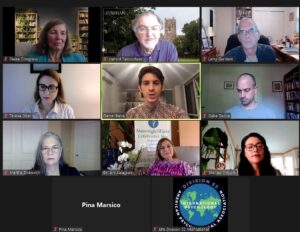
Post-War Recovery Humanitarian Mission in Armenia
Chris Gorrie & Dr. Ani Kalayjian
Between 29 April 2021 and 17 May 2021, ATOP MeaningfulWorld was deployed to Armenia on a post-war relief and trauma healing mission. Violent conflict over Nagorno-Karabakh, a region located between Azerbaijan and Armenia, resumed in September 2020 after decades of peace. Military deployment and fighting between Azerbaijan, Turkey, and Armenia led to the destruction of civilian areas and a death toll of approximately 7,500, with the average age of soldiers being 20 years old. MeaningfulWorld went to Armenia to work with veterans, their families, and the community at large to provide post war recovery, trauma healing and meet a set of seven goals:
- To promote emotional post war healing and well-being.
- To transform generational trauma of genocide.
- To transform horizontal violence.
- To train professionals in the 7-Step Integrative Healing Model.
- To establish Peace & Forgiveness Gardens.
- To empower orphans in Children’s Centers.
- To train volunteers & promote suicide prevention lifelines set forth in previous missions.
The Humanitarian Mission to Armenia was jam-packed with a variety of activities and outreach. Our Humanitarian team is thrilled to have completed so much in such a short time. They were able to conduct numerous workshops, many of which were full-day affairs. They carried out over 14 workshops at Yerevan State University, the Armenian General Benevolent Union, European University, in Gyumri, as well as in Vanadzor under the auspices of the ACRPC (a human rights organization that MeaningfulWorld represents at the United Nations) and at over 6 other NGO’s and orphanages.
Through these workshops the Humanitarian team was able to reach veterans, students, officials, physicians, orphans, Ministries, families of those killed in war, and others. The team introduced many Armenians not only to the 7-Step Integrative Model, Emotional Intelligence, but also to Soul-Surfing, ecological healing, tapping, balancing Vagus Nerve, flower remedies, meditation, and more!
Other noteworthy highlights included the second printing of the Armenian translation of Dr. Ani’s book Forget Me Not and our presentation to all the Ministries. The team presented vital knowledge on Emotional Intelligence, how to transform Horizontal Violence, and nurturing meaning-making, putting in motion plans to incorporate these concepts into K-12 curriculum.
The development of the Emotional Support Lifeline was also a major success. After persistently communicating with the Yerevan Mayor’s office requesting permission to hold an outdoor concert, the team was finally granted their wish. An outdoor concert was held to raise awareness for the Emotional Support Lifeline. Children, adults, and elderly persons were in attendance, dancing, listening to qanoon playing, and networking. During the second workshop at Yerevan State University, the team gathered a pool of potential volunteers for the lifeline and uptrained them.
Overall, the Armenia Mission was a huge success, and the team is thrilled with the progress made. They can’t wait to see the Emotional Support Lifeline unfold over the coming months. The team conducted over 14 workshops, organized one international conference, and cohosted it, and organized an outdoor concert for suicide prevention awareness and prevention. Additionally, the team had meetings with four ministries (including meeting with the Japanese Ambassador), several women’s centers, a town hall, and an orphanage in three of the largest cities in Armenia, including Yerevan, Vanadzor, and Gyumri.
In conclusion, the team worked directly with over 350 people; indirectly, they outreached to over 1,500 people, and through Television and social media we reached close to a million people. We will follow up with a film and research outcomes shortly. For further information kindly contact, info@meaningfulworld.com or visit us at http://meaningfulworld.com/
Early Career Psychology (ECP) Corner!
We are delighted to have been able to honor two award recipients at the recent APA convention that took place virtually last month. Within the U.S., the award winner was Dr. Chunyan Yang. Outside the U.S., the award winner was Dr. Radosveta Dimitrova (Sweden). Both of these individuals demonstrated tremendous evidence of furthering the discipline and practical application of international psychology.
Specifically, Dr. Yang serves as an Assistant Professor at University of California- Berkely, and has authored/co-authored 46 scholarly publications and presented/co-presented 62 conference presentations. Two examples of her recent work include, “Distance learning engagement, family communication, and internalizing problems among Chinese American families during COVID- 19 pandemic” and “Parental perceptions of school climate in the United States and China: Advancing understanding of measurement and cross-national considerations.”
Dr. Dimitrova serves as an Associate Professor at the University of Bergen, Norway and is the current Associate Editor of Journal of Child and Family Studies as well as a past editor of APA Division 52 International Psychology – International Psychology Bulletin (IPB). Dr. Dimitrova was the past Guest Editor for Emerging Adulthood Special Issue on Identity and Acculturation, Child & Youth Care Forum, Current Issues in Personality Psychology Special Issue on Identity across Cultures and for Journal of Adolescence Special Issue on Immigration. Dr. Dimitrova is the editor of a book on well-being of immigrant families published at Springer and has submitted over 400 reviews of manuscripts for peer-reviewed journals over the last years.
We are so proud of these award-winning ECPs!
We also want to announce that Dr. Tatyana El-Kour won the 2021 Division 52 Committee Chair Election, she will be the ECP chair elect for the year 2022. Congratulations Dr. El-Kour.
Warmly,
Cristina (ECP past chair), Antonio (ECP chair), & Lora (ECP chair elect)
Message from 2021 Student Chair
Daniel Balva
Div. 52 Student Chair 2021
Dear Division 52 Student Members,
I hope this newsletter finds each of you safe and well as we quickly progress towards the latter part of the term. It was a pleasure and an honor to be able to connect with so many wonderful students from within the division and from across the globe during the 2021 Virtual APA Convention and the many incredible student-focused events at the Division 52 Global Suite Café. Not only did we have an array of fascinating presentations from students that centered on internationalizing psychology, COVID-19, and individual research projects, but we also had student presenters in attendance who represented a span of countries, including but not limited to, Brazil, Canada, Chile, China, Colombia, Honduras, India, Malaysia, Mexico, Panamá, South Korea, and the United States. We were also honored to be able to partner with the Students Work Group of the Interamerican Society of Psychology (SIP) and the International Section of APA’s Division 17 (Counseling Psychology) to expand our reach and connect with even more students. Nevertheless, we are excited for many more important and meaningful student collaborations to come!
For those who attended, our Student Committee was privileged to host a Global Leadership Panel with leaders in psychology from across the globe including Dr. Larry Gerstein (Division 52 President), Dr. Carlos Zalaquett (Past-President of the Interamerican Society of Psychology), Mrs. Nicola Gale (Vice President of the European Federation of Psychologists’ Association), Ms. Tamara Cavenett (President of the Australian Psychological Society), Dr. Tjut Rifameutia (Past-President of Asian Psychological Association), Dr. Saths Cooper (President of Pan-African Psychology Union), Dr. Brigitte Khoury (Vice-President of the Arab Union for Psychological Science), and Dr. Katija Khan (President-Elect of the Caribbean Alliance of National Psychological Associations). Between this impressive panel and a Global Student Networking Event that we hosted with students from across the globe, we had more than 75 students and professionals from around the world come together to connect in the name of a more unified and international discipline! Recordings from these events can be found on the Division 52 website.
We also had many students join us during the Division 52 Business Meeting and Awards Talk to support fellow students from the division who were honored for their important contributions to international research and leadership. As such, we extend a warm congratulations to the following students:
- Stephanie Beckman, recipient of the Jean Lau Chin Graduate Student Award for Outstanding International Leadership.
- Aldo Barrita, recipient of the Anastasi Early Graduate Student Research Award.
- Iris Yi Miao and Rita Rivera, recipients of the Anastasi Advanced Graduate Student Research Awards.
- Stylianos Syropoulos, recipient of the Student International Research Award.
Congratulations to each of the student award recipients! As we look forward to the remainder of the 2021-2022 term, we are excited for more meaningful student programming yet to come—all of which can be found on the Student Webpage of the Division 52 website, in addition to more opportunities to continue acknowledging student contributions to the profession.
In the last quarterly International Psychology Bulletin (IPB), I had the distinct honor of announcing that the division’s membership had approved student voting privileges as it relates to Division 52 affairs and elections. As we continue to celebrate this historic advance, I am honored to share wonderful news with our student membership once more. Currently, student membership dues for Division 52 are $32, which, as one can imagine, can result in financial inaccessibility for many students—both within the United States and across the globe. However, as of January 1, 2022, we are excited to announce that student membership dues will reduce to $18. This is a significant step, not only for the division in terms of being more accessible to students, but also for our students as a sign that their participation, involvement, and membership is valued within the division.
Throughout this term, we have been fortunate to have had the support of our Executive Board members and the membership at large, and we are grateful for collaborative efforts to best serve our students. And on behalf of our Student Committee, we will continue to advocate for more student rights, privileges, and opportunities both within Division 52 and within the profession. Together, we can continue to make a difference within the realm of international psychology, and together, we can strive to make Division 52 a more inclusive home and refuge to psychology students around the world. Here is to more student programming, advocacy, advances, and celebrations in the years to come!
Sincerely,
Daniel Balva, M.S., NCC, CRC
Student Chair, APA Div. 52, International Psychology
Student Section of Division 52 Website
Highlight from the Global Student Networking Event hosted by Division 52’s Student Committee, the Global Student Psychology Committee (GSPC), the Students Work Group of the Interamerican Society of Psychology (SIP), and the International Section of Division 17 (Counseling Psychology) on Saturday, August 14, 2021.
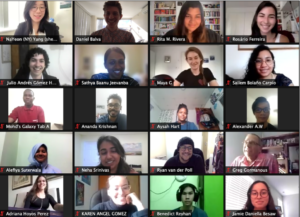
International Collaboration in the Study of Positive Youth Development: Advancing Research, Policy and Practice in Global Contexts
Arash Nemat
This contribution is about a global international collaboration on Positive Youth Development (PYD) as a powerful strength-based model identifying pathways to successful social and individual well-being, psychological and public health, developmental competences, thriving and success among young people. One of the most recent and relevant advancements in the field is represented by the upcoming Handbook of Positive Youth Development: Advancing Research, Policy and Practice in Global Contexts edited by Radosveta Dimitrova and Nora Wiium at Springer https://www.springer.com/gp/book/9783030702618. The handbook represents a groundbreaking expansion of the PYD field globally with innovative conceptual and methodological approaches for researchers, stakeholders, policymakers and practitioners, useful interventions and priority areas for PYD scholarship and resources. The volume advances the new generation of PYD scholarship globally and in marginalized understudied contexts, with a total of 37 chapters across 38 countries based on original empirical evidence from 22,083 youth and emerging adults in diverse parts of the world. The volume covers newly produced scientific knowledge and areas of growth in PYD across the globe and specifically in underrepresented contexts and vast geographic regions (e.g., Africa, Asia, Australia, Europe, Middle East, New Zealand, North and Latin America) in two sections –Part I PYD in Global Contexts and Part II PYD Applications and Interventions. The major aims achieved throughout the volume regard the advancement of the theoretical and empirical knowledge on PYD internationally; refinement of PYD methodological issues and measurement and integration of PYD scholarship with research, policy, and practice. The volume is a product of a global international collaboration entitled Positive Youth Development across Cultures (PYDAC) project initiated by the editors who have gathered wide international PYD research network. The project applies a PYD perspective rooted in and relevant to a more global and culturally informed study of human development, public health and international psychology with scholars expanding PYD research, measurement and applications in a global perspective across 30 countries and expertise in diverse disciplines (e.g., psychology, public health, environmental science, sociology, family studies, prevention and intervention science), career development and publishing opportunities. This volume is a valuable resource for international psychologists and interested scholars in broader social sciences to advance relevant frameworks on human development, public health, well-being and thriving.
International Perspectives in Psychology: Research, Practice, Consultation
New Frontiers for International Perspectives in Psychology: Building Forward Better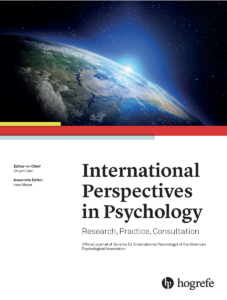
Stuart C. Carr, School of Psychology, Massey University, Aotearoa/New Zealand
Ines Meyer, School of Management Studies, University of Cape Town, South Africa
Professor Ines Myer has been selected and has agreed to serve as the next Editor of our Division’s Journal, International Perspectives in Psychology: Research, Practice, Consultation. Professor Myer will officially begin her 5-year term as Editor on January 1, 2022
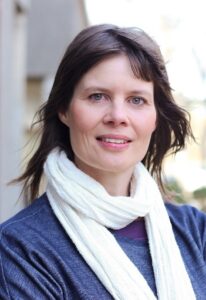 Ines Meyer is a Professor in Organizational Psychology at the University of Cape Town (UCT). Before starting her academic career, she worked in industry and with community-based organizations in South Africa. The latter shaped her academic focus: how organizational psychology can add value in alleviating poverty, reducing inequality and creating more humane workplaces. She currently holds the National Research Foundation’s South African Research Chair Initiative’s chair in Creation of Decent Livelihood and Sustainable Work, through which she advocates that the question about what the economy needs to recover becomes secondary to what humans need. Ines was nominated for a UCT distinguished teacher award three times. She has headed UCT’s Section for Organisational Psychology, served on and chaired the Commerce Faculty Transformation Committee, was Acting Dean for Transformation, and represented the faculty on the university’s social responsiveness committee.
Ines Meyer is a Professor in Organizational Psychology at the University of Cape Town (UCT). Before starting her academic career, she worked in industry and with community-based organizations in South Africa. The latter shaped her academic focus: how organizational psychology can add value in alleviating poverty, reducing inequality and creating more humane workplaces. She currently holds the National Research Foundation’s South African Research Chair Initiative’s chair in Creation of Decent Livelihood and Sustainable Work, through which she advocates that the question about what the economy needs to recover becomes secondary to what humans need. Ines was nominated for a UCT distinguished teacher award three times. She has headed UCT’s Section for Organisational Psychology, served on and chaired the Commerce Faculty Transformation Committee, was Acting Dean for Transformation, and represented the faculty on the university’s social responsiveness committee.
Ines has supervised over 100 Honours (a degree between Bachelor’s and Master’s in the South African tertiary education system), Masters’ and PhD students to completion. She has presented her work in more than 20 conference presentations, winning a best paper award at the 7th Equality, Diversity and Inclusion International Conference in 2014. Her publications feature in Sustainability Science, The Journal of Organizational Behavior and Psychological Science, amongst others. She serves as a reviewer on local and international journals and has been Associate Editor of International Perspectives in Psychology: Research, Practice, Consultation since 2018. She initiated and co-organized the first Political Psychology in South Africa conference and is co-hosting the Equality, Diversity and Inclusion International annual conference in Cape Town in 2022. She is a founding member of Project GLOW (Global Living Organisational Wage), an international network of researchers seeking to determine a wage level which would allow people, organisations and communities to prosper and thrive. She is also a member of the Society of Industrial Psychology (SIOP), the American Psychological Association (APA) and its Division 52 and has served as an executive board member for the Global Organisation of Humanitarian Work Psychology (GOHWP). She represents the Society of Industrial Psychology at the United Nations (UN) in Geneva as a badged UN representative.


Greetings Division 52 Members!
We want to thank you for your patience on the dissemination of this issue! We also want to thank everyone across our great Division for your support and dedication to the IPB, for the first time since 2018 IPB met its goal of disseminating four issues!!!!
In saying that, as editors we have also made the decision that we will be moving to a new dissemination schedule that will publish three issues annually. These issues will come out in January, June, and October of each year. In addition to the traditional submission formats we request, we will have specific aim of each issue to increase collaboration and communication across the Division.
January – A focus on reflections from the previous year and our hopes and goals for the field of international and global psychology for the upcoming year!
June – News and updates for the annual APA Convention.
October – Reflections from the annual APA Convention
Please see our call for proposals for our traditional submission requests that we will be accepting for each issue:
 Loading...
Loading...
Upcoming Issue: Our January issue will focus on reflections from the 2021 year and our hopes and goals for the field of international and global psychology for the year 2022!
Please email us your submissions for our January issue, questions, or other ideas at ipbdiv52@gmail.com. The deadline for January issue will be December 20th.
Best,
Steve and Joyce
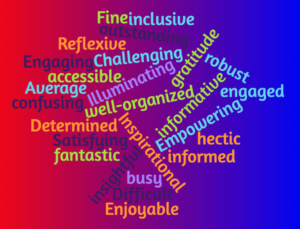 Reflections on the Virtual APA Convention 2021
Reflections on the Virtual APA Convention 2021
*word cloud generated from a survey asking Div52 members to share 3 words that describe their experience at the convention

